A decade of Police Scotland - fewer officers, more work
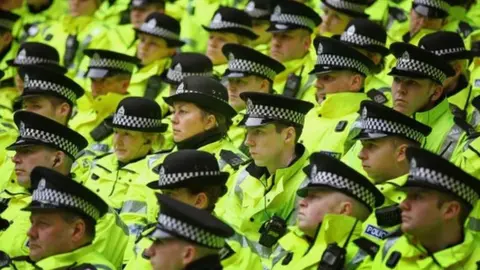 Getty Images
Getty ImagesIn the 10 years since it came into being, Police Scotland has achieved its primary purpose of saving the public purse hundreds of millions of pounds.
But as the force enters its second decade, the relentless financial pressure has left it facing an uncertain future.
A great deal has happened, good and bad, since the country's eight regional forces merged into one on 1 April 2013.
On the plus side, it is now difficult to get away with murder in Scotland thanks to major investigation teams whose expertise is dispatched wherever required.
Of the 580 homicides in the past decade, only one has not resulted in a suspect being reported to prosecutors.
And the Police Scotland has successfully dealt with a string of high-profile, high-risk events such as COP26 in Glasgow in 2021.
It was billed as the UK's biggest security operation since the London Olympics and it passed without incident.
The force's policing of the pandemic was also widely praised, as was Operation Unicorn, the events which followed Queen Elizabeth's death at Balmoral last year.
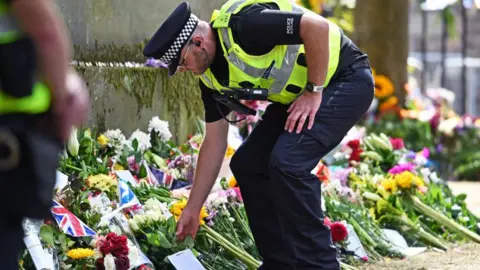 Getty Images
Getty ImagesRecorded crime is said to be at its lowest level since 1974 and the latest statistics show that overall satisfaction following contact with the police stands at 69%.
On a daily basis, with next to no fanfare, thousands of men and women serve the public in one of the toughest jobs in the public sector.
But on the downside, Scotland now has 16,600 police officers, the lowest number since 2008 and roughly 900 fewer than when the national force came into being.
Those officers are the only ones in the UK not routinely equipped with body worn video, a situation described by a former deputy chief constable as "professionally embarrassing".
IT challenges are partly to blame but a national rollout of the equipment could finally get under way next year.
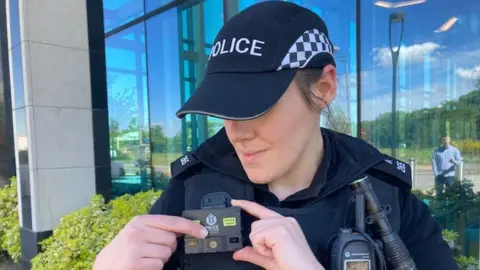
As well as that about 140 police stations have closed and community policing has been cut back.
A former senior officer told the BBC: "The fundamental basis of UK policing is community policing. If we have 16,600 officers, that's not far off 1,000 less than we had at the start.
"If we still had them, we would have a far better chance of sustaining what the public expects."
In addition to this, two incidents from early in the new force's life are still having consequences which it is dealing with today.
In May 2015, Sheku Bayoh died in police custody in Kirkcaldy. His death and the aftermath are being examined at a public inquiry which will run well into next year and possibly beyond.
In July of the same year, the force took three days to respond to reports of a crashed car beside the M9 motorway.
Two people died and Police Scotland earned a criminal conviction over a series of failures linked to a staff shortage that followed the amalgamation of call centres.
Later this year a fatal accident inquiry into the M9 incident will get under way.
Apart from the impact on its reputation, these inquiries will cost the force millions of pounds in legal fees.
Police Scotland was also forced to make a pay-out of almost £1m to a former firearms officer after an employment tribunal ruled she had been victimised for making complaints about sexism.
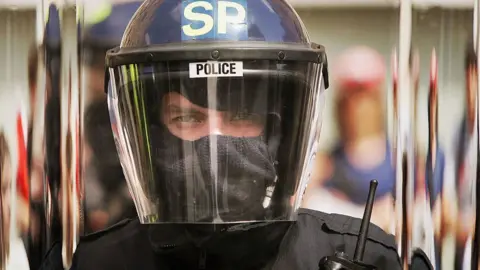 Getty Images
Getty ImagesMore huge sums have also been paid to businessmen who were arrested in 2014 following the collapse of Rangers football club.
Year on year, the drive for cost saving efficiencies is not going away and the chief constable who steadied the ship after its stormy start has announced he is going to retire this summer.
Fighting budget cuts last year, Chief Constable Sir Iain Livingstone said the force has made annual savings of £200m since 2013 and had swallowed far more than its fair share of austerity.
The Scottish government points out that the starting salary for Scottish police officers is £5,000 more than their colleagues in the rest of the UK, and it increased police funding by 6.3% this year.
The body which scrutinises Police Scotland, the Scottish Police Authority, has said the latest budget settlement is in effect a real terms reduction with implications for "policing prioritisation".
So what lies ahead?
Sir Iain Livingstone says they will have to be "even leaner" in their delivery of key services. He complains that the force is having to "pick up the slack" from other agencies.
Last year it dealt with more than 185,000 calls about vulnerable people and officers frequently spent hours waiting at A&E.
That's echoed by the Scottish Police Federation, which represents officers up to the rank of chief inspector.
It also points to the changing nature of crime, which has moved from the public to the private space.
Old fashioned crimes like housebreaking are falling. Cyber crime has to be fought online, keeping officers indoors and not visible on the streets.
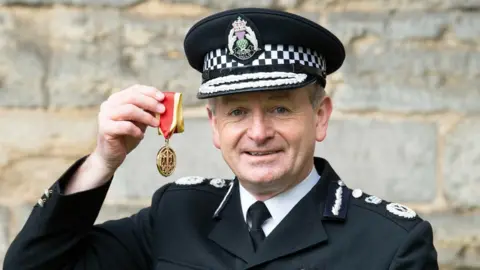 PA Media
PA MediaCombine that with the demands of new legislation and an increase in the reporting of historic sex offences, and you have a smaller workforce coping with a bigger workload.
SPF chair David Threadgold said: "Police officers are having to work on their days off continuously.
"Their time off and time with their families is restricted and the impact of that on their health is significant. There's a genuine sense of frustration at where we are at the moment."
The chair of the Scottish Police Authority, Martyn Evans, is hoping to raise the issue of officers spending hours in A&E with the new cabinet secretaries for health and justice.
He says greater investment in the force is needed, particularly in technology, but he still has this upbeat assessment.
He says: "If there's any place in the UK or in the world where I'd like to be policed, I would say it's Scotland. Not in the past, but now, in Scotland. I think we have an outstanding police force."
East Lothian MP Kenny MacAskill was the SNP's justice secretary when the force came into being. He says the financial crash of 2008 made amalgamation a necessity.
"We had to make the change to make the savings but in doing so we had to make sure we had the best possible police service," he said.
"The financial pressures have resulted in the difficulties for community policing. That is something that has to be addressed. All in all though Police Scotland has delivered, and still continues to deliver."
No-one is arguing that the clock should be turned back but with money as tight as ever, the direction of travel seems clear.
In years to come, Scotland is going to have a smaller, less visible police force. The challenge will be to create a service model that works for everyone - the public, the politicians and the police themselves.
